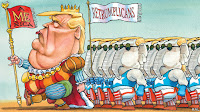[Cartoon by Kevin Kallaugher. The Economist.]
 Every few weeks, The President of the United States says or tweets something that irritates, amazes or just plain drives me half-crazy. As to whether this is a deliberate strategy, or just the man’s mental incontinence and quick trigger finger, I cannot decide. This article by AP News documents the most recent outrage in pretty objective terms.
Every few weeks, The President of the United States says or tweets something that irritates, amazes or just plain drives me half-crazy. As to whether this is a deliberate strategy, or just the man’s mental incontinence and quick trigger finger, I cannot decide. This article by AP News documents the most recent outrage in pretty objective terms.But I have to ask: if you’re willing to go to the polls in person to check whether your mail-in ballot has been received, why even bother to vote by mail? Just vote in person.
I doubt Trump thought it through that way. There are many possibilities. Perhaps he felt an urgent need to rally his troops in a strident call to action, but ended up just shooting from the hip without thinking it through at all. Or perhaps he’s laying the groundwork for a future claim that the election was rigged, a hoax, invalid, fake news, and it’s all because some people’s votes weren’t counted and others were counted twice. That will come in handy if he happens to lose the election.
Or maybe he simply delights in trying to stir up trouble and confusion, to distract people from something else.
Whatever his motives, there are all kinds of problems with the approach he’s suggesting. Imagine the chaos if crowds of people show up at the poll in person on Election Day demanding to vote again unless someone can prove to them that their mail-in vote has been "counted." Poll workers would have to deal with disputes and temper tantrums while everyone else waits in line, infecting one another with covid-19.
In addition, giving people that second chance to vote is bound to increase the risk of an inaccurate count. No system is perfect, and the more people are allowed to vote twice because we can’t find their mail-in ballot, the greater the risk that duplicate votes go undetected. That hurts the public’s confidence in the system. In the worst case, it would give Trump a reason to refuse to accept the results of the election.
Of course, Trump's approach to politics has already hurt confidence in so many things. Never did I imagine that people in this country would come to doubt the fairness of our elections, but somehow it has happened. Two people I know personally are deeply concerned that their vote will not be counted, or will be somehow stolen. Trump's "polling place double-check" idea plays directly to this paranoia. It doubtless appeals to conspiracy theorists and disaffected voters who suspect that shadowy forces are at work, pulling the strings like a diabolical puppet master behind the scenes, trying to thwart the President’s efforts to drain the swamp and Make America Great Again.
It borders on irresponsible for an elected official to make a proposal like Trump's just two months from Election Day. If we're going to consider changing our election process this way, it should be done deliberately and with care. Let's consult experts, such as whoever oversees the election in each state. Get input from the public. Hold Congressional hearings. Do it carefully and with transparency, not in haste.
Personally, I don't think any of that is necessary. Our election system has worked pretty well for the past 200 or so years. I think mail-in voters should just trust the system to capture their vote effectively. If they cannot get comfortable with that, then they should forget the mail-in idea and vote in person on Election Day.
This post began as a response to someone’s comment on a Facebook post. But at my wife’s insistence I’m trying to avoid doing battle on Facebook. So I turned it into a blog post instead.












